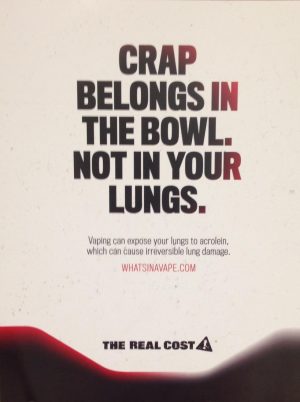Vaping: the new plague?
Vaping concerns in the United States increase and the death toll rises. Efforts are being made at West to prevent vaping, but it may be a bigger issue than previously thought.
The idea of e-cigarettes is nothing new, but the 39 mysterious deaths and many more illnesses of young people across America are something never seen before. Cigarettes take you years or even decades to notice the effects but vaping has killed individuals as young as 17. We are in the midst of an epidemic, and the new victims? Teens.
“People will leave class early, and you know where they’re going,” said Melissa Uc ’23. “Bathrooms are a very popular place.” Ask around, and you’ll find similar responses from many students. School restrooms are plagued with flavored fumes, and flash drive-look-alike Juuls are now an expected part of high school for many.
“Once I got to high school everyone was talking about it,” said Ronan Smith ’20. “Kids do it with the mentality of ‘good time, not a long time,’ but then they get health problems and get sick and suddenly it’s a lot scarier when it’s actually happening to you.” Current high schoolers have been told not to smoke since elementary school. The consequences our guidance counselors and health teachers have told us about are black lungs, rotting teeth, and cancer, it’s nothing new. Kids don’t seem to stray away from vaping, however.
“In eighth grade it became a lot more prominent within people I was acquaintances with,” Uc said. Although modern electronic cigarettes have been in the US since the early 2000s, the outbreak of illnesses and deaths has increased dramatically in recent years. According to the CDC, The number of vaping-related lung illnesses reported in the US rose to 2,051, along with 37 deaths, with 54% of patients admitted under 25.
Tommy Stevens ’20 was first introduced to vaping (specifically Juuling) during his junior year of high school, the same year as Uc, 2018.
“I think this is true of anything, of like, what you’re doing, like what you’re eating, or what you’re smoking and what that means. It’s easy not to think about what it is and what’s happening,” Stevens said. The National Institute on Drug Abuse describes e-cigarettes as “battery-operated devices that people use to inhale an aerosol, which typically contains nicotine.” Due to its modernness, experts do not know the long-term effects of vaping. Unlike cigarettes, people are dying unexpectedly and without a definite cause.
West is not turning a blind eye, however. Posters featuring catchy phrases like “Crap belongs in the bowl, not your lungs” have been displayed on bathroom doors and walls, and students have noticed.
“Kids that are vaping are so far above that, they’re just gonna laugh at them,” Smith said. These posters show that the school is taking notice. Obviously students have noticed as well, but the chances of changing vaping habits might be slim.
“I think it’s good that they’re by the bathroom doors […] it can’t be under teachers’ supervision,” says Uc. “[But] I don’t think they’ll do a whole lot. […] There’s not a great way to kind of just say stop vaping, because it’s really hard to.”  Nicotine, one of the most addictive substances you could inhale, is present in Juuls and most other e-cigarette brands. Many unknowing teens try it once and don’t realize that every time they take a hit they are accustoming their brains to a high concentration of nicotine and a slew of other chemicals.
Nicotine, one of the most addictive substances you could inhale, is present in Juuls and most other e-cigarette brands. Many unknowing teens try it once and don’t realize that every time they take a hit they are accustoming their brains to a high concentration of nicotine and a slew of other chemicals.
“I think it’s really gross, and I think that children are not equipped to handle things like that in their lives,” Smith said. In August, Juul CEO Kevin Burns said that Juul products would continue to stay on the market until evidence was presented that the deaths and illnesses are specifically tied to Juuls.
“If there was any indication that there was an adverse health condition related to our product, I think we’d take very swift action,” said Burns. According to NPR, Juul has now agreed to stop marketing its products to minors and has suspended sales of non-tobacco and non-menthol-based flavors. Steps are being taken not only at the national level but at the local one as well.
Whether the posters on the walls of West will help or not, vaping weighs heavily on the minds of students and the word is spreading. The future of vaping is uncertain, but for now, we can only hope that people listen to the facts and choose to take control of their own lives. The vaping story is not over.